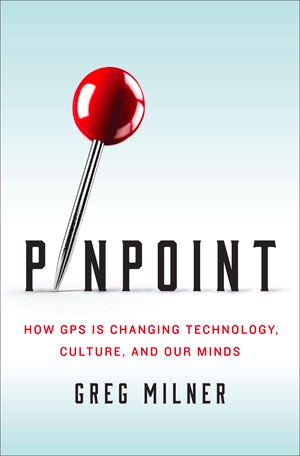Review: Pinpointby Jeff Foust
|
| The book notes the opposition to the GPS program within the Air Force during its development: remarkably shortsighted in retrospect, but understandable at the time when its revolutionary capabilities weren’t understood even by its proponents. |
Communications, though, may no longer be the most influential space-based service. Instead, positioning, navigation, and timing services, provided predominantly by the US Global Positioning System (GPS), have become a critical, if often unseen, service underpinning everyday life. “Although it is less visible, GPS’s influence on the world equals or exceeds that of the Internet,” writes Greg Milner in the introduction of his book Pinpoint, about the effect of GPS on society. And, after reading the book, you’d be hard-pressed to disagree.
The first part of the book covers the history of the development of GPS. While not a thorough programmatic history of the program, it does examine some of the precursor efforts, like Transit, Timation, and Project 621B. It also notes the opposition to the program within the Air Force during its development: remarkably shortsighted in retrospect, but understandable at the time when its revolutionary capabilities weren’t understood even by its proponents. That includes the roles pioneering GPS companies like Magellan and Trimble played in finding commercial interest in navigation systems.
The second part of the book focuses more on various effects that our increasing reliance on GPS has on society. Part of this is on the benefits GPS has offered, from precision agriculture that increases crop yields for farmer to improved navigation for aircraft landing at congested or challenging airports. There’s also, though, the dark side of GPS: the dangers of denied access to GPS through spoofing or jamming, and so-called “death by GPS,” when people, overly reliant on their GPS receivers, drive into lakes or off cliffs (a problem not with GPS itself, but rather with the receivers’ mapping systems or drivers who don’t pay sufficient attention to the road.)
This latter part is something of a pop science book, mixing anecdotes on topics as diverse as plate tectonics, GPS-aided driver tracking, and even a Google Street View image of a man lying in a Manhattan street. These get tied together at times in both entertaining and informative ways: Milner links interference at a GPS-aided aircraft landing system at Newark International Airport with the use of GPS jammers by truckers on the nearby New Jersey Turnpike who don’t want to be tracked by their employers.
| The latter part of Pinpoint is something of a pop science book, mixing anecdotes on topics as diverse as plate tectonics, GPS-aided driver tracking, and even a Google Street View image of a man lying in a Manhattan street. |
Milner also touches on another, more controversial topic: whether the increased us of, and reliance upon, GPS is affecting our minds. Studies have suggested that use of GPS can “narrow” cognitive maps in our brains compared to people who use maps and memorize directions (one of the most notable examples being London cab drivers, who must pass an exam on the city’s streets known as “The Knowledge.”) How serious those effects could be is still open to debate, but it’s worth remembering that for all the “death by GPS” events, they are hardly the first time drivers got lost though misinterpreted or misunderstood directions.
Even with these potential cognitive drawbacks, the benefits of GPS are clearly stated in the book. (Milner glosses over other satellite navigation systems, largely dismissing Russia’s Glonass as not as reliable; China’s Beidou and Europe’s Galileo are still under development, although Beidou does provide regional service now.) There are understandable concerns about being overly reliant on GPS, but its too late to turn back now: living without GPS for a day would likely be just as hard, if not harder, than living without the Internet for a day.
